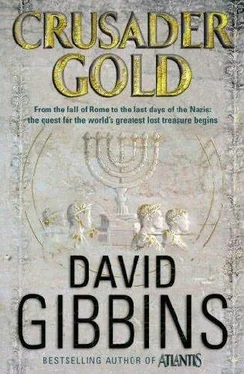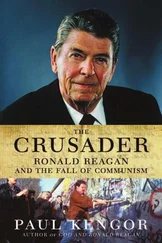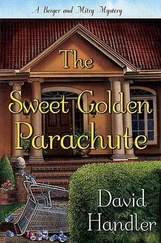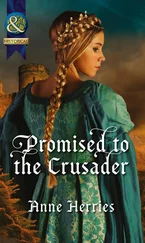David Gibbins - The Crusader's gold
Здесь есть возможность читать онлайн «David Gibbins - The Crusader's gold» весь текст электронной книги совершенно бесплатно (целиком полную версию без сокращений). В некоторых случаях можно слушать аудио, скачать через торрент в формате fb2 и присутствует краткое содержание. Жанр: Прочие приключения, на английском языке. Описание произведения, (предисловие) а так же отзывы посетителей доступны на портале библиотеки ЛибКат.
- Название:The Crusader's gold
- Автор:
- Жанр:
- Год:неизвестен
- ISBN:нет данных
- Рейтинг книги:3 / 5. Голосов: 1
-
Избранное:Добавить в избранное
- Отзывы:
-
Ваша оценка:
- 60
- 1
- 2
- 3
- 4
- 5
The Crusader's gold: краткое содержание, описание и аннотация
Предлагаем к чтению аннотацию, описание, краткое содержание или предисловие (зависит от того, что написал сам автор книги «The Crusader's gold»). Если вы не нашли необходимую информацию о книге — напишите в комментариях, мы постараемся отыскать её.
The Crusader's gold — читать онлайн бесплатно полную книгу (весь текст) целиком
Ниже представлен текст книги, разбитый по страницам. Система сохранения места последней прочитанной страницы, позволяет с удобством читать онлайн бесплатно книгу «The Crusader's gold», без необходимости каждый раз заново искать на чём Вы остановились. Поставьте закладку, и сможете в любой момент перейти на страницу, на которой закончили чтение.
Интервал:
Закладка:
“Yes, please,” Jeremy said.
“So why the glum face?” Costas said.
“It’s what else they found.” Maria suddenly sounded tense. “Right at the bottom of the stairwell, buried under all the paper and vellum. A skeleton of a man, a tall man, dressed in a monk’s cassock. Hundreds of years old, medieval. His limbs were askew as if he’d been thrown there. And the back of his skull was shattered.”
There was a stunned silence, and O’Connor paced towards the reproduction of the Mappa Mundi on his wall before turning to face them. “It is as I suspected. In the spring of 1299, Richard of Holdingham, mapmaker, came to this very place, to the isle of Iona. He was accompanying his ailing master, Jacobus de Voragine, Archbishop of Genoa, on his final journey. Afterwards Richard went south to Hereford, to oversee the completion of the map he had started fifteen years before. There were errors in the inscriptions he wanted to correct. He had left an exemplar, a sketch for the Hereford monks to work from, and the illuminator had not been very literate. And now we know from his own personal exemplar, the one Jeremy and Maria found, that he wanted to add more, that he had a secret addition he wanted to make in the left-hand corner of the map, where the monks later added the inscription naming him as mapmaker.” O’Connor stopped in front of the fireplace, deep in thought. “We know he spent his final night at Bishop Swinfield’s palace at Bromyard and that he walked the final road to Hereford in the guise of a pilgrim. After that he vanished from history. The corrections were never made. He was never heard of again.”
“You think he was murdered?” Maria said shakily.
“I have no doubt of it.”
“I felt so close to him,” Maria whispered, her voice shaking with emotion and her hands gripping her chair. “I’ve studied him all my life, and I’ve never felt as close to him as I did that evening in the cathedral. It was almost like he was there.”
“A murder?” Costas looked dumbfounded. “And what was this guy doing on Iona? Can someone tell me what’s going on here?”
“Yes,” said O’Connor, pulling open a drawer. “Listen to me.”
A few minutes later O’Connor sat back in his chair and let the others study the maps he had just been showing them. Rolled out over the desk was a large-scale map of northern Britain, and beside it he had placed a plan of the Battle of Stamford Bridge in 1066. On the large map he had traced a line from the Yorkshire coast near Stamford Bridge up to the northern tip of Scotland and down the west coast to the island of Mull.
“So Harald Hardrada came here to Iona after the battle.” Jack’s mind was reeling as he struggled to comprehend what O’Connor had just been telling them. He lowered himself back into his chair, and the others followed suit.
“He must have been in a hell of a state,” Costas said. “Bad enough for the English soldiers who fought him to assume he was dead on the battlefield.”
“It was a miracle he survived the journey,” O’Connor replied. “He was well looked after. There were about thirty of his warriors altogether, almost all of them grievously wounded, many former Varangian Guards. They were rowed in the two longships by loyal retainers. Some died on the way, some here on Iona.”
The pieces were beginning to fall together in Jack’s mind. “When Harald finally left Iona to sail west, there was a contingent left behind, loyal followers to await the return of their king.”
O’Connor looked at him shrewdly and nodded. “They called themselves a felag,” he said. “An ancient Norse term for a fellowship, a secret society.”
“And who were the felag?” Jack asked.
“At first they were a few of Harald’s companions, wounded survivors of Stamford Bridge who came with him to the holy isle but elected to stay behind when their king sailed west. They were younger men, warriors Harald had nurtured since his Varangian days, men who still had ambition and fire within them to carry on the cause. They may have included several of Harald’s own sons. Quickly they accrued others around them, never more than twenty in number. Their sworn intent was to keep the flame burning for the return of their king, to do all in their power to ensure that a true Viking once again ruled in England.”
“Not very realistic after 1066,” Jack said.
“They hated the Normans and their French Plantagenet successors. Within a few generations the cause of the felag had become the cause of the English. Remember, there was plenty of Viking blood already in England, among those who called themselves Anglo-Saxon. The Viking king Cnut had ruled England in the time of Harald’s youth, and there were huge swathes of the country where Viking raids had led to settlement and intermarriage: in East Anglia, in Northumbria, up here in the western isles. So it was natural that the English, once the enemy of Harald’s Vikings at Stamford Bridge, should unite with them in common cause against the Normans.”
“They can’t realistically have expected Harald’s return.”
O’Connor shook his head. “It became a mystical underpinning, a binding force that made the felag one of the most successful secret societies of the Middle Ages. Those few original companions had sworn secrecy to their king, that they would never reveal his survival or his passage west, for fear that the Normans would try to follow or take reprisals. After a few generations, when the return of the king in this life became impossible, they began to look forward to joining Harald at the great Battle of Ragnarok, the final showdown in Norse mythology between good and evil. They would once again stand shoulder to shoulder with their liege, wielding battle-axes alongside him, vanquishing their foes and spreading fear as they had done in the glory days of the Varangians. Their sacred mantra, the oath that bound them in fellowship, became hann til ragnaroks, Old Norse for ‘until Ragnarok,’ until we meet at the end of time.”
“So the name Harald Hardrada passed into history.”
“Not quite.” O’Connor reached out to his bookcase and handed a volume over to Jack. “Geoffrey of Monmouth, Historia Regum Britanniae, History of the King of England. A medieval bestseller, mostly fictional.”
“And?”
“The book responsible for the romantic legend of King Arthur.”
“Good God,” Jack murmured. “Of course. The once and future king.”
“Geoffrey was one of the felag, a couple of generations after Harald had gone. They were sworn never to mention the name of their king, but by the middle of the twelfth century the felag had begun to make inroads into English society. In the face of Norman oppression it became expedient to spread the fantasy of an ancient British king, a heroic leader who would one day return to free his people. Peel off the romantic fiction and you’ve got some hard facts.”
“For King Arthur, read Harald Hardrada,” Jack murmured. “For the Knights of the Round Table, read the Varangian Guard.”
“It’s what you said about Atlantis,” Costas added. “Behind every myth there’s some reality.”
“Yes, but people had been debating the Atlantis myth for ages,” Jack replied. “This one’s a bolt from the blue.” He turned to O’Connor. “So the felag wasn’t all just mystical?”
“By no means. By espousing the English cause they easily gained adherents, and as the generations passed the felag came to represent the great and the good among those who claimed Anglo-Saxon and Viking roots. They had little hope of infiltrating the Norman aristocracy, so by the time the last of the original Varangians had died, most of the felag were churchmen, pagans in disguise. The Church was the one area where Englishmen of Anglo-Saxon and Viking blood could still wield power, and the felag used it to their utmost advantage. By the end of the twelfth century their influence reached as far as Rome, and the membership included churchmen in Europe with English connections. Jacobus de Voragine, Richard of Holdingham’s master and one of the senior clergymen in Italy, was the bastard child of an English mother who claimed descent from King Cnut. On several occasions there were even members among the College of Cardinals in the Vatican.”
Читать дальшеИнтервал:
Закладка:
Похожие книги на «The Crusader's gold»
Представляем Вашему вниманию похожие книги на «The Crusader's gold» списком для выбора. Мы отобрали схожую по названию и смыслу литературу в надежде предоставить читателям больше вариантов отыскать новые, интересные, ещё непрочитанные произведения.
Обсуждение, отзывы о книге «The Crusader's gold» и просто собственные мнения читателей. Оставьте ваши комментарии, напишите, что Вы думаете о произведении, его смысле или главных героях. Укажите что конкретно понравилось, а что нет, и почему Вы так считаете.












